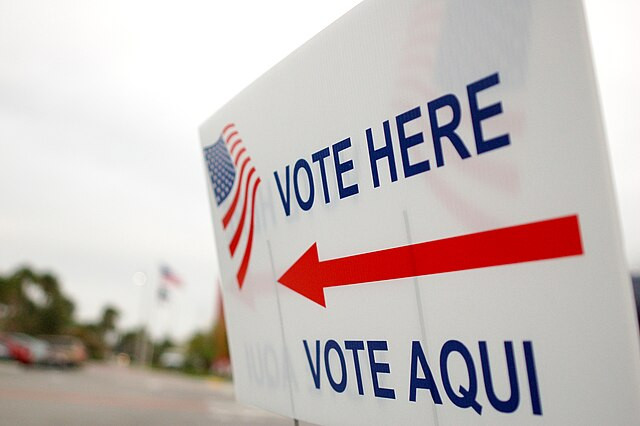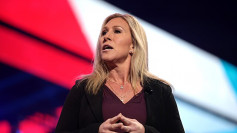The U.S. Supreme Court has temporarily blocked a federal court ruling that had ordered Virginia to restore 1,600 voters to its rolls, a decision that comes just days before the state's election. The emergency ruling is a significant win for Virginia Governor Glenn Youngkin and his administration, who argued that the state's voter roll maintenance program, which removes noncitizens, is lawful and necessary to protect election integrity.
At the heart of the case is Virginia's voter removal program, which was implemented in August. The program identifies noncitizens by cross-referencing Department of Motor Vehicles (DMV) data with voter registration records. Those flagged as noncitizens receive a notice informing them of their potential removal from the voter rolls, unless they provide proof of citizenship within 14 days. The program has been challenged by the Department of Justice (DOJ), which argues that it violates the National Voter Registration Act's (NVRA) requirement to cease all "systematic" voter roll removals within 90 days of a federal election.
In its appeal to the Supreme Court, Virginia's Attorney General Jason Miyares contended that the state's process is "individualized" and does not constitute the kind of broad purge prohibited by the NVRA. The state argued that ensuring only eligible voters participate in elections is critical to maintaining election fairness, a point echoed by Governor Youngkin. In a statement following the ruling, Youngkin called it a "victory for commonsense and election fairness," adding that it was important to protect the integrity of the state's elections.
The DOJ, however, disagreed with the Supreme Court's ruling. The department filed a lawsuit earlier this month, alleging that the removals occurred too close to the upcoming November 5 election and violated federal law. "We brought this suit to ensure that every eligible American citizen can vote in our elections," a DOJ spokesperson said, expressing disappointment with the Supreme Court's decision. Civil rights groups, including the Virginia Coalition for Immigrant Rights, also voiced concern, stating that eligible voters may have been removed due to clerical errors or because they had since become U.S. citizens.
The case has garnered national attention, particularly because of its broader implications for voter roll maintenance and election law. In recent months, 26 Republican-led states joined Virginia in filing amicus briefs to the Supreme Court, backing its stance. These states argue that the DOJ's reading of the NVRA is overly broad and could prevent states from taking necessary steps to ensure noncitizens do not vote. The attorneys general of these states urged the court to allow Virginia's program to continue, stating that clean voter rolls are essential to a fair electoral process.
The legal battle escalated last week when U.S. District Judge Patricia Giles, an appointee of President Joe Biden, ruled that Virginia's program violated the NVRA's "quiet period" rule. Giles ordered the state to halt its removals and reinstate the 1,600 voters who had been flagged for removal. Her decision was based on the concern that Virginia's data-matching system was insufficiently accurate to ensure only noncitizens were removed. The 4th U.S. Circuit Court of Appeals upheld Giles' ruling, agreeing that the removal of voters so close to an election carried the risk of disenfranchising eligible citizens.
However, Virginia officials maintained that their process was necessary to prevent noncitizens from voting. They argued that the NVRA does not apply to noncitizens and that their program provided adequate safeguards, such as giving flagged individuals notice and the opportunity to prove their citizenship before being removed from the rolls. Miyares emphasized that the program was conducted in accordance with both state and federal law and was an essential measure to protect the integrity of the upcoming election.
The Supreme Court's decision to temporarily block the lower court's ruling allows Virginia to continue its program ahead of next week's election. The court's ruling has sparked controversy, with legal experts divided on the implications. Some analysts criticized the decision, noting that it conflicts with the Purcell Principle, which advises courts against making election-related changes close to Election Day to avoid confusion. Others, however, praised the ruling as a necessary step to ensure that only eligible voters are allowed to participate.
Joyce Vance, a former federal prosecutor, expressed her disappointment with the Supreme Court's decision, calling it a "disgraceful departure" from established legal principles. She warned that the ruling could set a dangerous precedent for future cases involving voter roll maintenance. Laurence Tribe, a constitutional scholar, also criticized the ruling, suggesting that it signals a willingness by the court's conservative majority to support actions that could suppress votes.
On the other hand, Republican officials, including former Kansas Attorney General Kris Kobach, lauded the decision. Kobach, a staunch advocate of voter ID laws and tighter election security, argued that the ruling upheld the constitutional right of states to determine their voter qualifications and protect their elections from interference.






